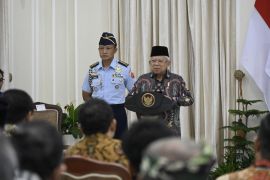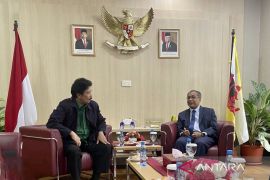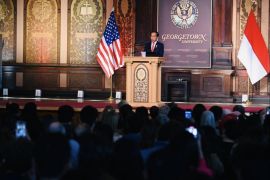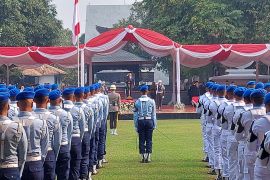On Friday, 5th of May 2017, President Joko Widodo (Jokowi) confirmed that the Coordinating Ministry for Political, Legal and Security Affairs (Kemenkopulhukam) has conducted review on the existence of anti-Pancasila community organizations in Indonesia (Kompas, May 5). Later the 10th of July, President Jokowi signed the Government Regulation in Lieu of Law (Peraturan Pemerintah Pengganti Undang-Undang or Perppu) No.2/2017 amending the Law on Mass Organizations (UU Ormas), which was apparently driven by efforts to maintain national unity and prevent the growth of anti-Pancasila sentiment through mass organizations. Following the introduction of Perppu No.2/2017, on 19th of July, the Law and human Rights Ministry officially revoked Hizbut Tahrir Indonesia’s (HTI) status as a legal entity. It can be said that the dissolution of HTI is the clear example of how the government seriously tackle the so-called anti-Pancasila groups.
The efforts to protect Pancasila as state ideology and way of life of Indonesian are not without political and security risks. Just to mention a few, the popularity of the government in the eyes of Indonesia’s Muslim community especially after the long exhausted debate on the Ahok’s blasphemy case is at stake. From the perspective of human rights, Indonesia as a state party to the International Covenant on Civil and Political Rights (ICCPR) has a duty to respect and protect its citizen’s rights to freedom of expression, association, and thought, conscience and religion. From the fear of deepening radical thought of intolerance into hostility or violent actions, the dissolution of HTI may have side effect of radicalization among HTI members. Last but not least, the issues surrounding the Perppu No.2/2017 has invited political and legal debates that may remain fragmented among experts, politicians and also publics in general.
This article will not discuss neither the pro-cons of Perppu No.2/2017 nor its impact, which are undoubtedly imperative. But two important questions will be discussed in this article. Do we hear the alarm sound of Pancasila now and how do we react to this alarm?
My direct answer to the first question is yes, the alarm of Pancasila has been turned on. This alarm is not exclusively related to the dynamic of political Islam during the Jakarta gubernatorial election because if it is then it should be sounded when the “Defend Islam†rally turned violent in the 4th of November last year. Three most logical explanations of why the government thinks they should review the anti-Pancasila groups are to prevent further development of challenging ideology such as religious based ideology, liberalism and communism, to strengthen the position of Pancasila as state ideology and guidance for its citizens, and finally to remind Indonesian people that the role of Pancasila is not as suppressive binding ideology but more like a mutual agreed understanding about maintaining our cohesive socio-political relations in unity.
After the introduction of Perppu No.2/2017 and the dissolution of HTI, a lot of public discussion either polemic in the media or seminar talked about Pancasila from many different angles. In one side, public awareness of Pancasila may dramatically increase, but on the other side the campaigns of supporting government decision and the counter campaigns from those who oppose it may create further divided views. More and more discourses and narratives are being developed in order to support or defy Perppu No.2/2017. This dynamic is normal in democracy as long as all parties are obedient to the law. The democratic test for Indonesia is not about winning or losing the debate but how Indonesia can reach a situation where Pancasila unites the nation without being seen as imposing restriction in the name of Pancasila. This is not an easy task for any government, and we should remember that turning on the alarm of Pancasila timely is essential for the future of Indonesia.
How do we react to this Pancasila alarm? First I believe we should look carefully at Indonesia’s history as nation and state. Our parents, grand parents and so on fight for freedom from colonialism and our founding fathers agreed to create a new nation state called the Republic of Indonesia. Since the beginning, our founding fathers encountered a difficult problem of whether or not Indonesia should become a republic or an Islamic state. Rizal Sukma in his book Islam in Indonesian Foreign Policy, believed: "the debate in the Investigating Body for the Preparation of Indonesian Independence (Badan Penyelidik Usaha-Usaha Persiapan Kemerdekaan Indonesia, BPUPKI) on the issue finally ended with the affirmation of dual identity, which defined Indonesia as neither secular nor theocratic, but Pancasila state."
This debate is neither about winning nor losing between the competing ideas of state but more like a careful consenting among representatives within the BPUPKI for the best future of Indonesia as Pancasila state. Second, Pancasila is not against any religions, and on the contrary Pancasila is based on religious beliefs as expressed and implied in its precepts. Third, our current understanding of Pancasila is influenced by the New Order government’s exploitation of Pancasila to crush all political opposition in the past. We should correct this and put Pancasila appropriately as state ideology and not merely as a tool to force the people to obey the government.
Ideological bankruptcy
One of the most visible causes of a bankruptcy in trade or business is when we lose customers. This goes the same for ideology; it can be abandoned or even abhorred like communism in Indonesia. Thanks to reform and democracy, as the customers, the citizens of Indonesia after 1998 have more choices to express their aspiration in almost all aspect of our nation life. However, this freedom has put some fundamental nation state principles at risk like Pancasila ideology. When more and more Indonesian people start to struggle to define Pancasila then this is a sign of its bankruptcy. A stronger indication of its bankruptcy is when many people start to think about replacing it with different kind of ideology, for example those who campaigning anti-Pancasila. Whenever, a state ideology is under a threatening pressure that will lead to its bankruptcy, it is normal for any government to take a necessary step to reduce or eliminate the pressure.
Regarding the potential threat to Pancasila, in one hand, Jokowi administration effort to address the issue of anti-Pancasila movement is a strategic manoeuvre to keep Indonesia unites in harmony. But on the other hand, it may fall into the same trap as the New Order regime in its strategy to control Indonesian citizens. Therefore, a regular review and supervision by all national stakeholders are very crucial in determining the future of Pancasila and its relations with Indonesian people in general. Since the impacts of shutting down organisations or groups that belongs to anti-Pancasila category may take a long period of time, the government should be more cautious in following the socio-political dynamics in the society responding to the closure actions.
Nobody or maybe only a very small number of people seriously thinks of returning to the New Order political systems. This is not only because of their political faults, but also because of the rampant corruptions, collusion and nepotism. We should not forget that on May 5, 1980, a very influential critic against the New Order regime named the Petition Fifty (Petisi 50) occurred. The Petition Fifty, which was an "expression of concern" (ungkapan keprihatinan), voiced concern over President Suharto’s interpretation of the state ideology Pancasila and accusations subversion against the government. Without careful study and consistency within the law, Jokowi administration may unintentionally repeat the same path as the New Order regime.
Avoiding the New Order mistake
To avoid the same mistake as the New Order in applying Pancasila as the sole state ideology, Jokowi administration should consider at least five factors. First, it will be more acceptable if the assessment of anti-Pancasila movements or groups is based on academic studies or deep investigations that can be accounted for objectively. For example, the review should be able to answer the question to what extend that a group can be categorise as anti-Pancasila. Those who openly and clearly campaigning the replacement of Pancasila as state ideology are easy to define. However, those who campaigning alternative way of thinking about the future of Indonesia based on different ideology are more delicate and complicated to analyse. Second, the authoritarian approach of New Order model like one-way dictation and interpretation of Pancasila should be avoided. The inclusion of relevant experts and civil societies may help in producing a balance approach in defining the anti-Pancasila issues at least through a serial of consultation involving representatives from different mass organizations.
Third, views from members of parliament (DPR-RI) are very valuable in the making of corrective measures regarding anti-Pancasila occurrences. This may open a public debate whether or not it is necessary. But at the end of the day, this will be very effective in increasing public awareness of the potential threat against Indonesia’s state ideology. The discussion on anti-Pancasila issue at the Parliament does not necessarily in the format of hearing with relevant Ministries, but it should have a clear outcome to strengthen Pancasila as state ideology without undermining democracy or deepening conflictual views on efforts to protect Pancasila.
Fourth, the narrative of anti-Pancasila organisations should be free from subjective targeting specific group especially religious based groups. For example, it should include all potential threat to Pancasila like liberalism, communism, and also radical interpretation of religious teaching and so on. By doing a more broad coverage, the government can guarantee that the review is not targeted to a specific group. This can avoid a tendency of clashing Pancasila with specific ideology, especially religious based ideology for example the concept of Caliphate or Khilafah. Despite the fact that majority Muslim Indonesia is content with democracy and Pancasila, the concept of Khilafah is not foreign to Indonesian Muslim. The more the pressure to obliterate Khilafah idea by power may attract a stronger and bigger sympathy from wider Muslim community. This alluring unpredicted result of clashing Pancasila with Khilafah is not only dangerous for the government, but also more importantly very threatening to the security of the people. One of the best ways to deal with Khilafah idea is to moderate it with the nature of the existence of state to protect the citizens and provide goods and services that the citizens cannot provide individually for themselves.
Regarding objective narrative of anti-Pancasila, political observer Boni Hargens’ suggestion of disbanding the Jehovah’s Witnesses is very important to note. He was not only provide reasons why the government should dissolve the Jehovah’s Witnesses based on its activities preaching and recruiting followers from other religious groups in Indonesia, but also compare it with the disband of the Jehovah’s Witnesses by the Russian Supreme Court. Of course the government cannot arbitrarily make a hasty decision. In line with my first suggestion that review or evaluation whether a mass organization is regarded as anti-Pancasila or not should be accountable and objective.
Fifth, challenges from those who consider themselves targeted by Perppu No.2/2017 are inevitable. Perppu No.2/2017 is asserting the principle of actus contrarius that the authorities, which have power to adopt a particular legal measure – like issuing legal status for mass organization, also has power to abrogate or amend it. This principle is not without critics that many still see the importance of legal process before revoking the legal status of any mass organization as required by the Law No.17/2013 on Mass Organization. Despite the debate on the principle of actus contrarius, it should be noted that the disbanded mass organizations could file a lawsuit to the court to challenge the revocation of its legal status. In the context of fairness and justice, this is where the “law fight†starts and the court is independent in deciding whether the government decision is correct or not in revoking a mass organization like HTI.
Saving Pancasila
Saving Pancasila from bankruptcy is not the same as crushing freedom of expression, association, and thought, conscience and religion similar to the New Order model. Resistance will always occur in respond to repression and injustice, so the efforts to uphold and actualize Pancasila must consider a way of strategic communication including with the groups that fall into anti-Pancasila category to moderate them. This communication may start with dialogue or decision to dissolve anti-Pancasila group. The most important thing is that we as Indonesian should be aware of the importance of state ideology like Pancasila. This awareness is not in the context sanctifying Pancasila and demonizing anti-Pancasila, but more into a deliberate understanding of the extraordinarily important role of Pancasila to keep us as one nation.
To end this article, it is back to all Indonesian citizens to think carefully about our peaceful coexistence under the banner of the Republic of Indonesia and be grateful with it. With so many potential clashes and splits based on ethnicity, religion, race, and inter-group relations, Indonesia has experiences many painful conflicts with many casualties. Please remember, Pancasila may be only a human made principle and not a holy sacred verse from God. However, do we realise the possible unforeseen and unpleasant consequences from losing it?
*The writer is a PhD candidate at the University of Leicester, UK. The views expressed are his own.
Reporter: Puguh Sadadi*
Copyright © ANTARA 2017











